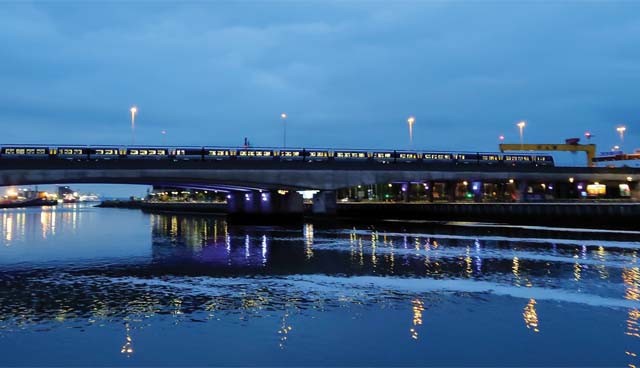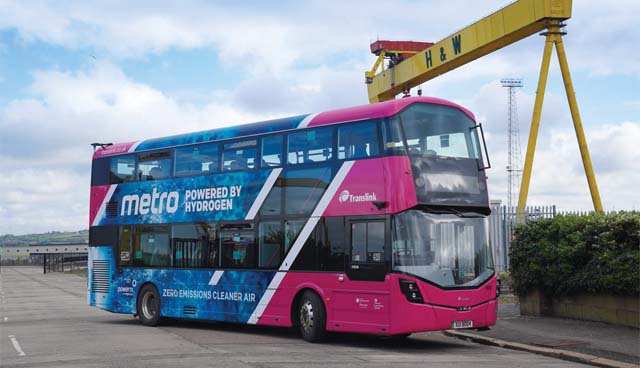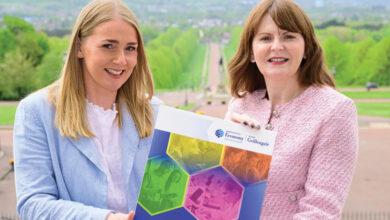Better. Connected.

 Translink has ambitious plans for the future of transport in Northern Ireland. A high quality, zero emission public transport network is vital for the economic, social and environmental wellbeing of our society and we are committed to leading the transformation of transport locally, writes Translink Group Chief Executive, Chris Conway.
Translink has ambitious plans for the future of transport in Northern Ireland. A high quality, zero emission public transport network is vital for the economic, social and environmental wellbeing of our society and we are committed to leading the transformation of transport locally, writes Translink Group Chief Executive, Chris Conway.
The ongoing period of recovery from the pandemic presents an opportunity to make us all better connected, with bus and rail travel at the centre of a ‘green’ recovery. In a world where climate change and the drive to net zero is a key global issue, Translink will be at the forefront of Northern Ireland’s pathway to zero emissions in the years ahead, with climate action right at the heart of everything we do.
With the COP26 summit in Glasgow later this year likely to set the global agenda on net zero for years to come, it is essential that public transport plays its full part in a worldwide shift towards a better and greener future for everyone.
Public transport is at the heart of the post-pandemic recovery, reconnecting communities to employment, education, retail and leisure and helping to boost our economy, as well as driving positive environmental change by improving air quality and reducing congestion. It is vital that we continue to maintain and expand a comprehensive network to deliver a long-lasting sustainable recovery that tackles climate change.
Public support
Recent research surveying public transport users and non-users across Northern Ireland, reveals that 79 per cent of respondents intend to return to their normal workplace, at least some of the time, by the end of 2021, with over 50 per cent of those surveyed also saying they would be happy to use public transport immediately, as restrictions ease. The same research has identified several factors that will be key to encouraging greater take-up of bus and rail services, including the use of face coverings, enhanced cleaning, and provision of hand sanitisers, areas in which Translink continues to lead the way. Significantly, over two thirds agreed that public transport is a better option for the environment, a crucial message as we move forward.
A responsible recovery
Covid-19 has helped us realise what is truly important in our lives: family, community, and health and wellbeing. But it has also shone a light on the environment and air quality and given us a glimpse of what a less congested Northern Ireland could look like. The significant improvements in global air quality during 2020 occurred while public transport continued to operate, providing essential services to key workers.
Climate change is now the biggest threat we face and air pollution poses a significant risk to personal health, with congestion impacting on our economy and quality of life.
In order to combat this, a high quality, integrated public transport network will be vital to address the climate crisis and drive the change towards a healthier, more active and better quality of life for future generations.
Translink is committed to driving positive climate action in every aspect of our business. Our initial zero emission buses have already entered service and we will have another 100 zero emission buses joining the fleet in the coming months. By mid-2022, we will be proud to operate the UK’s fourth-largest zero emission bus fleet, harnessing hydrogen and battery technology.
We aim to operate a fully net zero bus and rail fleet across our network by 2040, with fleets in Belfast and Derry~Londonderry achieving this ambitious target by 2030.
On our railway network, we will explore the potential for electric/hydrogen technologies and are aiming to transition to these by 2040.
We have invested in 21 new Class 4000 intermediate carriages to facilitate the creation of a number of six-carriage walkthrough trains, providing an additional 1,600 seats across the NI Railways network every day. These will enter service by early 2022.
We are also participating, alongside Irish Rail, in an all-Island Strategic Rail Review. This will consider how the rail network on the island of Ireland can improve sustainable connectivity between major cities, enhance regional accessibility and support balanced regional development. In addition, the review will consider the feasibility of higher speeds on the network and the potential to increase use of the network for freight.
Our path to the future
Pre-pandemic, record numbers of passengers were using public transport; in 2018/19, approximately 85 million passenger journeys were made on our network, the highest figure in over two decades.
It is clear that investment in public transport to deliver an enhanced passenger experience, modern low and zero emission vehicles, improved frequency and reliability and improved customer flexibility and choice are vital incentives to drive increased usage. As we look to a post-pandemic future, there is an opportunity to grow passenger numbers further, with additional fleet investment, technology advances and customer choice.
We continue to invest to make public transport an attractive option for everyone, not only with significant fleet investment and in new technologies but also in new and upgraded passenger facilities. We completed work on the North-West Transport Hub in Derry~Londonderry during 2020, a £27 million project supported by the EU’s INTERREG VA fund and by government investment to restore the listed 19th Century station building on the banks of the Foyle. We are progressing construction of the Belfast Transport Hub, which will replace the existing Europa Bus Centre and Great Victoria Street Train Station, a major flagship project which will be a transport-led regeneration project at the heart of a new city neighbourhood called Weavers Cross. We are also progressing the building of a new train station at York Street in north Belfast.
We are developing customer-led, innovative ticketing solutions with a focus on ease of use, integration, convenience and value via our new ticketing system, which will commence roll-out across the network in 2022. We want to use ticketing to encourage integration and boost public transport usage and as a key part of this commitment, we will roll out account-based ticketing and contactless tap-on/tap-off ticketing, as well as expanding our mobile app technologies, helping to provide greater convenience and flexibility for our passengers.
“We recognise the importance of working closely with our stakeholders to deliver shared economic, environmental and social goals for the people of Northern Ireland and for future generations.”
We welcome the ongoing consultation on Glider phase 2, building on the success of the existing east-west and Titanic Quarter route with plans to expand the network into north and south Belfast, encouraging modern, environmentally friendly rapid transportation and representing a vote of confidence in Belfast and in public transport.
Connecting communities
We recognise the importance of working closely with our stakeholders to deliver shared economic, environmental and social goals for the people of Northern Ireland and for future generations.
Linking with public health policy, public transport plays an important role in encouraging active travel. We will work with key stakeholders including the Department for Infrastructure, elected representatives, businesses, local councils, the Public Health Agency and Sustrans to improve the integration of public transport and active travel to help improve our environment and drive down pollution and congestion.
We will also continue to review our network and enhance services and timetables in line with changing demands, demographics and new travel habits, some of them as a result of the pandemic. Enhancing accessibility is a key focus, as is providing cost-effective rural services to help sustain our towns and villages, connecting them to larger centres.
Research indicates the vital role that public transport can play in social mobility, with indicators that an improvement in bus service connectivity is associated with a reduction in social deprivation. In a society where 20+ per cent of households record no access to a private vehicle, public transport provides a vital day-to-day service and has continued to do so throughout the pandemic.
While it has been immensely challenging for everyone, Covid-19 has presented an opportunity to do things better, and the COP26 summit this November can be the kickstart that society needs to advance the actions required to address climate change and the impact it will have on us all. Translink looks forward to working with all stakeholders in the months and years ahead to lead the transformation of transport to net zero in Northern Ireland and build back responsibly from Covid-19.
Please see www.translink.co.uk for further information.







